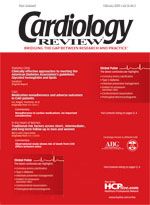Publication
Article
Cardiology Review® Online
Natriuretic peptide and the management of acute dyspnea
The management of patients presenting to the emergency department with acute dyspnea is challenging. The rapid and accurate differentiation of congestive heart failure (CHF) from other causes of acute dyspnea, in particular, often remains elusive. Even after reviewing the patient’s history, physical examination, electrocardiogram, and chest radiograph, the diagnosis may still be uncertain, resulting in misdiagnosis and a delay in instituting appropriate treatement.1-4 Misdiagnosis of heart failure can lead to morbidity, increased time to discharge, and higher treatment costs because treatment methods for patients with other conditions, such as chronic obstructive pulmonary disease, may be detrimental in heart failure patients, and vice versa.1-4
B-type natriuretic peptide (BNP) is a 32-amino acid polypeptide secreted from both the left and the right cardiac ventricles in response to ventricular volume expansion and pressure overload.5-8 Recent studies have suggested that this neurohormone is reliably elevated in the setting of decompensated CHF and may be very helpful in its diagnosis1,2; however, the real impact of this new diagnostic test on the evaluation and management of patients with dyspnea in clinical practice and whether its use may affect patient outcome or cost of treatment is unknown. We performed the BNP for Acute Shortness of Breath Evaluation (BASEL), a prospective, randomized, controlled, single-blinded study, to test the hypothesis that a BNP-guided diagnostic strategy would improve the evaluation and management of patients presenting to the emergency department with acute dyspnea and, thereby, reduce time to discharge and total cost of treatment.
Patients and methods
The BASEL study was conducted in the emergency department of the University Hospital in Basel, Switzerland, and included 452 patients. According to a computer-generated randomization scheme in a 1:1 ratio without stratification, patients were randomly assigned to receive a diagnostic strategy with (BNP group, n = 225) or without (clinical group, n = 227) the use of BNP levels provided by a rapid bedside assay (figure 1). Patients with severe renal disease (serum creatinine > 250 µmol/L) and patients in cardiogenic shock were excluded.
Results
The BASEL study recruited a consecutive series of elderly patients with extensive comorbidity. Slightly more than 40% of patients were women. Patient history included coronary artery disease and hypertension in one half of the patients, chronic obstructive pulmonary disease in 30%, any pulmonary disease in 50%, and diabetes in one fourth of the patients. Baseline characteristics were well matched between the study groups.
The median time interval from presentation to initiation of the appropriate therapy according to the final discharge diagnosis was reduced from 90 minutes in the control group to 63 minutes in the BNP group (P = .029). The use of BNP levels significantly reduced the need for hospital admission or intensive care. Time to discharge was significantly reduced in the BNP group (median 8.0 days) as compared with the
control group (median 11.0 days;
P = .001). This translated into a significant reduction in mean total treatment cost from $7,264 in the clinical group to $5,410 in the BNP group (P = .006; figure 2). Twenty-one patients (9%) in the clinical group and 13 patients (6%; P = .19) in the BNP group died in-hospital.
Discussion
The BASEL study is the first randomized, controlled study of BNP testing in the emergency diagnosis of patients with acute dyspnea. In conjunction with other clinical information, the use of BNP levels reduced the time interval to initiation of the most appropriate therapy, the need for hospital admission and intensive care, and the total treatment time and total cost of treatment. Considering the enormous morbidity associated with dyspnea and the considerable cost associated with CHF, chronic obstructive pulmonary disease, and other causative disorders,1-5 BNP testing seems to represent a major advance in the management of patients with dyspnea.
The total treatment cost in this study was similar to the current expenses in the United States. In 1997, an estimated $5,501 was spent for each hospital-discharge diagnosis of heart failure.9 BNP testing reduced the total cost of treatment by 26%. Extrapolating this finding to the cost of hospitalizations for heart failure in the United States in 2000 of $24 billion,9 the use of this simple blood test may save up to $7 billion each year in the United States alone.
The findings of the BASEL study are complementary to those of observational studies in which BNP levels were validated against a retrospectively adjudicated diagnosis of heart failure by independent cardiologists. In the largest of these, the Breathing Not Properly Multinational Study,1,2 the combination of clinical assessment and BNP testing was more accurate than clinical assessment alone. The diagnostic accuracy of BNP at a cutoff of 100 pg/mL was 83%, its sensitivity was 90%, and its specificity 76%. The BASEL study extends these observations and shows that due to this more accurate diagnosis, BNP testing, in fact, improves patient outcome and resource utilization.
The clinical experience with BNP testing is limited. The interpretation of BNP levels applied in this study was based on the available data at the time the study protocol was prepared (figure 3). Additional studies are needed to help optimize the use of BNP testing in clinical practice. Normal values corrected for age, sex, and renal function may be a significant advance.10,11
Conclusion
The BASEL study demonstrates that, combined with other clinical information, rapid measurement of BNP improves the management of patients with acute dyspnea in the emergency department, thereby reducing time to discharge and total cost of treatment. n
